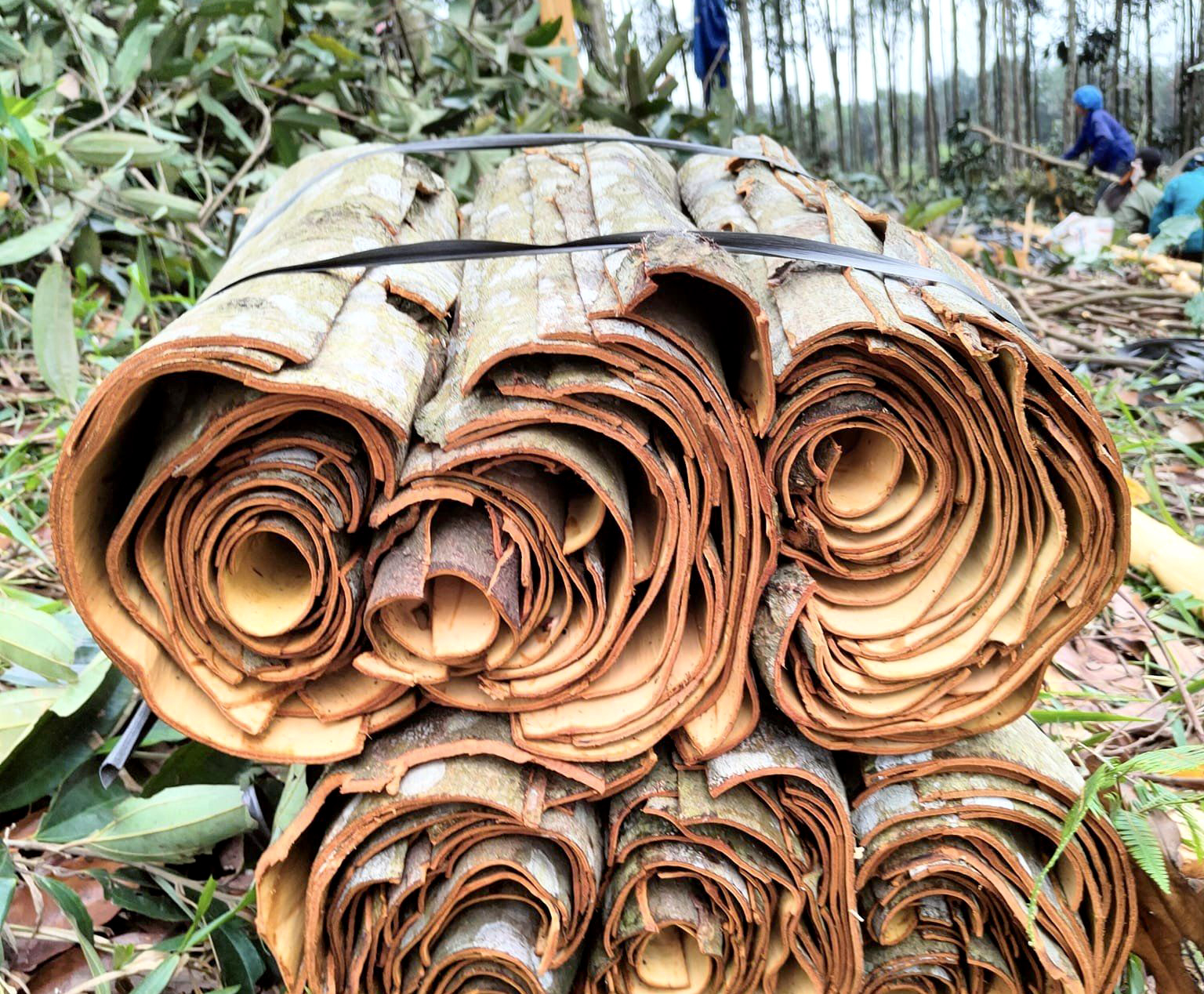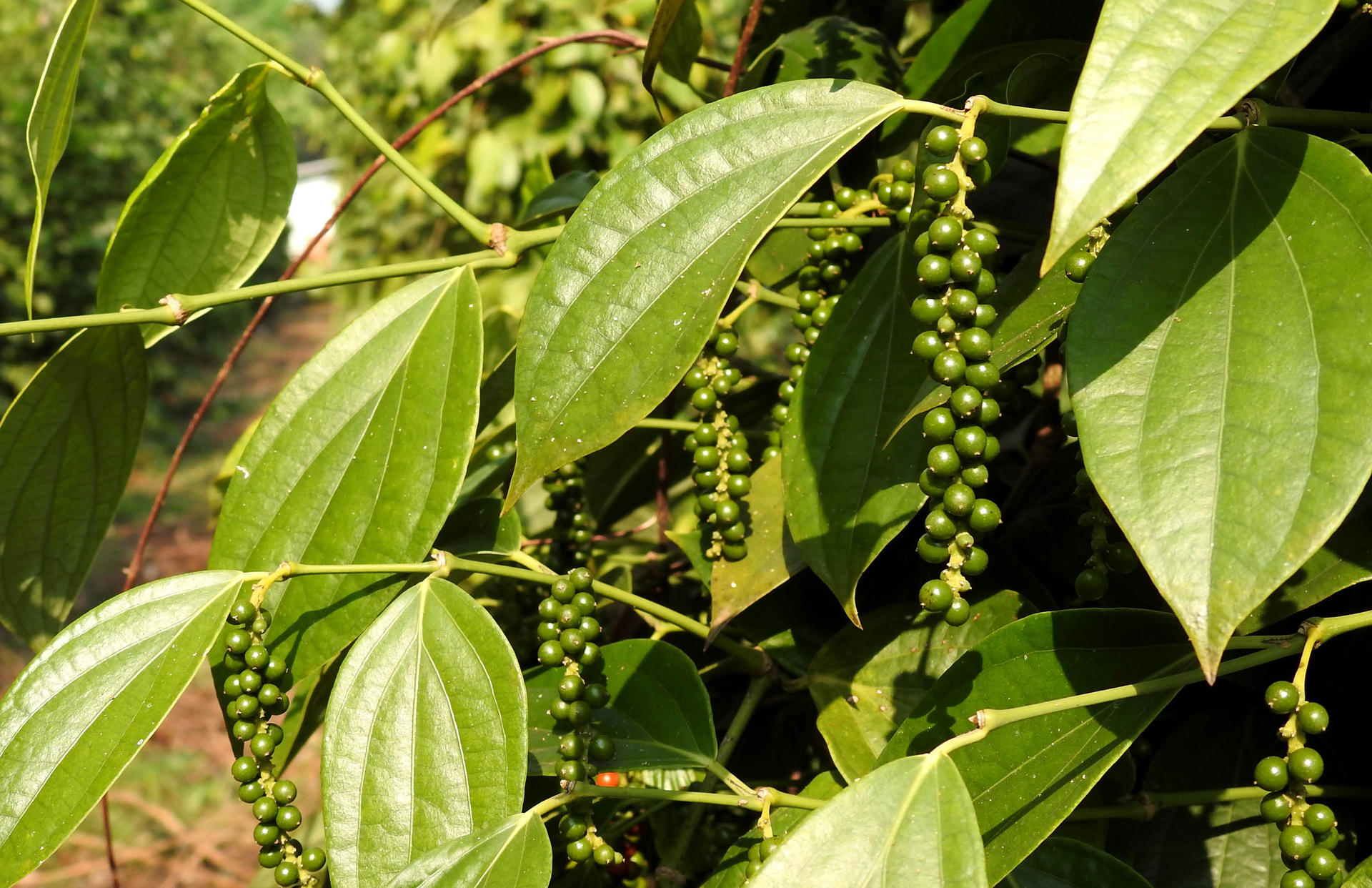June 16, 2025 | 16:31 GMT +7
June 16, 2025 | 16:31 GMT +7
Hotline: 0913.378.918
June 16, 2025 | 16:31 GMT +7
Hotline: 0913.378.918

Newly harvested cinnamon bark in Yen Bai province. Photo: Son Trang.
Vietnam is currently one of the world's leading producers of cinnamon. According to the Vietnam National University of Forestry, the country has a total cinnamon production area of nearly 170,000 hectares, spanning various provinces. Most notably, Yen Bai province houses the largest cinnamon production area at approximately 81,000 hectares, which accounts for nearly half of the country's total.
The estimated volume of cinnamon bark in Vietnam is currently estimated at 900,000 to 1.2 million tons, with an annual harvest of 70,000 to 80,000 tons. According to the World Spice Organization, Vietnam currently ranks third globally in terms of cinnamon production.
Similar to the production of many other crops, cinnamon production generates an impactful volume of greenhouse gas emissions. The Vietnam National University of Forestry recently conducted an in-depth analysis of the carbon footprint during the processes of cinnamon production, transportation, and processing in the Mau Vang commune, Van Yen district, Yen Bai province. This analysis involved studying the entire production process and conducting interviews with 35 out of a total of 243 production households participating in the "Sustainable Cinnamon Supply Chain Development in Yen Bai Province" project, which is sponsored by Nedspice with co-funding from IDH.
The analysis results revealed that the average emissions for 1 kilogram of cinnamon bark product amounted to approximately 1.5915 kilograms of Carbon dioxide equivalent (CO2e). Accordingly, emissions resulting from energy usage accounted for nearly 53% of the total amount, with gasoline and diesel fuel contributing to almost all of the energy-related emissions.

Organic pepper produced by Thien Nong Farm in Binh Phuoc province, with Nedspice as the primary consumer. Photo: Son Trang.
Throughout the post-harvest processing and domestic transportation stages, the total emissions from all sources amounted to 0.549 kilograms of cinnamon bark CO2e per kilogram. As a result, during the stages from production and harvesting, and from processing to domestic transportation, the average total emissions were estimated at 2.141 kilograms of cinnamon bark CO2e per kilogram.
The harvesting cycle for cinnamon is significantly longer compared that of other spices, with the harvesting process typically occurs between the 8th and 20th years, with some farms reporting trees as old as 30 to 40 years. Consequently, the emissions per kilogram of product are not excessively high on an annual basis.
Despite the relatively low levels of carbon emissions from cinnamon production, Nedspice Vietnam in Thuan An city, Binh Duong province, a leading exporter of pepper and spices, conducted a pilot sustainable cinnamon production program in Mau Vang commune, Van Yen district, Yen Bai province in 2022 and 2023.
According to Mr. Le Thanh Hung, Manager of the Farmer Linkage and Sourcing Program at Nedspice Vietnam, the program's activities were designed based on the company's experiences in sustainable production, certification, and close coordination programs with farmers. They also drew from the company's knowledge and experience in building sustainable supply chains and market access in the spice industry. Additionally, these activities received support, coordination, and supervision from experienced experts in sustainable farming and production as well as related partners such as IDH, CRED, and UEBT.
One of the most important goals of the program is to implement a certification program (RA-UEBT) for cinnamon producers and introduce several initiatives to minimize carbon emissions through sustainable forest management and biodiversity conservation. With this pilot program, Nedspice aims to achieve the following targets: training 300 farmers in sustainable cinnamon production, producing 1,500 hectares of cinnamon sustainably, certifying 600 tons of sustainable cinnamon, and increasing farmers' income from the production and consumption of certified sustainable cinnamon by 10 to 15%.
Regarding the pilot program, Mr. Hung recommended cinnamon producers to adopt a "Sustainable Landscape" approach to increase farmers' income beyond their main crops. Accordingly, farmers should engage in sustainable production and obtain the required market certifications.
As a leading producer and exporter of various spice products including black pepper, white pepper, nutmeg and cinnamon, Nedspice Vietnam is actively promoting partnerships to develop sustainable spice production. More than 4,500 farmers are currently collaborating with Nedspice to develop sustainable farming practices. Mr. Dang Duong Minh Hoang, owner of Thien Nong Farm in Binh Phuoc province, stated that Thien Nong has cultivated organic black pepper on an area of 8 hectares since 2016. The total output of organic black pepper from this farm is purchased and exported by Nedspice to demanding markets.
Translated by Nguyen Hai Long
/2025/06/12/3721-2-202745_83.jpg)
(VAN) TH made an impression at Seoul Food 2025 with its line of natural beverages, paving the way for Vietnamese food products to enter the South Korean market.

(VAN) Soc Trang's success in rice exports stems from a strategy of developing fragrant and specialty rice cultivation areas and standardizing production toward low-emission practices.
/2025/06/11/1311-5-120811_839.jpg)
(VAN) The pig farming industry is facing the challenge of comprehensive restructuring to meet requirements for quality, safety, traceability, and market expansion both domestically and for export.

(VAN) Vietnam considers participating in ALGROALBA in order to expand agricultural production, coordinate the assessment and effective exploitation potential land.
/2025/06/05/5314-1-184727_407.jpg)
(VAN) From seemingly worthless fish scales and skin, enzymes and lactic ferments can transform by-products into peptides, opening a sustainable, effective business direction and elevating Vietnamese seafood.

(VAN) TTC AgriS and IFC signed a strategic partnership to develop a sustainable agricultural value chain, aiming to achieve the Net Zero target by 2035.

(VAN) Seafood by-products are opening a new path, combining green growth and technological innovation to enhance the industry's value.